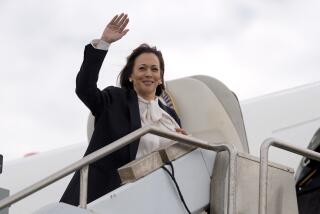Clinton to Offer Plan on Election Finance Reform
WASHINGTON â Eager to put the defeat of his economic stimulus package behind him, President Clinton next week will unveil a campaign finance reform package that would ban contributions from lobbyists to any candidate for federal office, The Times has learned.
The proposal also would virtually eliminate the so-called âsoft moneyâ contributions that are supposed to underwrite grass-roots party activities but often circumvent the intent of campaign finance laws by benefiting national candidates, according to knowledgeable sources.
Both proposals would likely create a great deal of unease in Congress, where members of both parties will appreciate the planâs voter appeal but likely fear the financial sacrifice they could face.
The campaign finance proposal will be made public along with long-awaited details of Clintonâs national service program, which will offer young people a chance to perform public service work to earn college tuition.
Clinton apparently hopes through the announcements to regain some political momentum and to beef up his early record in office. Both ideas were proposed during the presidential election campaign and have substantial voter appeal. Clinton hit hard on them from the campaign stump.
Administration officials said they hope the campaign proposal will win praise from reformers as well as from another group: the 19 million Ross Perot voters, whose candidate continues to call for curbs on lobbyists and âsoft money.â
Currently, special interest lobbyists--like all other individuals--may contribute up to $25,000 per year directly to a candidate and unlimited sums to political parties. Many contribute the maximum to candidates, thus providing a principal sources of campaign funds.
Dee Dee Myers, Clintonâs press secretary, declined to comment on the campaign finance proposal, saying that it is not yet completed. She denied that the two proposals are being prepared to draw attention away from Clintonâs first major legislative defeat, noting that Clinton had promised the plans within his first 100 days.
But she added that the unveiling âcertainly will have that effect. . . . I donât think the timing hurts. Everybody is ready to get on with the business that the President was elected to handle.â
It remains unclear how the Administration intends to define lobbyists and that may be a key provision of the proposal. But eliminating their contributions would not eliminate special interest money and influence in elections.
Political action committees could continue to operate under Clintonâs plan. Indeed, by cutting lobbyists out of the picture, the proposal probably would guarantee that Congress would not take the much-debated step of eliminating PACs, for fear of excluding a major source of campaign funds.
Furthermore, the proposal would not to curb the massive amounts of money that pour into campaign coffers from executives and employees of big corporations, who are not considered lobbyists even though they may be seeking favors from the government.
The proposal also calls for lifting the limit on individual contributions to candidates from the current $25,000 each year to $60,000 in each election cycle. Within the $60,000 maximum there would be sublimits. Voters could contribute up to one specified amount for candidates, political parties and grass-roots activities, such as voter registration and get-out-the-vote drives.
Structuring the proposal in this way is intended to head off criticism that âsoftâ money reforms could prevent contributions to state and local parties for legitimate political purposes, the sources said.
The proposals might hurt Democrats more than Republicans, since lobbyists give most to incumbents and Democrats outnumber Republicans in Congress. The soft money proposal would have a marked effect on the Democratic National Committee, which now employs about 160 people and pays 40% of their salaries from soft money contributions.
Rep. Bill Thomas (R-Bakersfield), who is closely involved with campaign finance as ranking Republican on the House Administration Committee, said Clintonâs timing in releasing the proposal looks âa little suspicious.â
He said the White House might be planning to offer a package that looks good and wins him credit for toughness but would be defeated in Congress. âThen they could say, âwe tried,â and the Republicans would get the blame,â he said.
More to Read
Get the L.A. Times Politics newsletter
Deeply reported insights into legislation, politics and policy from Sacramento, Washington and beyond. In your inbox three times per week.
You may occasionally receive promotional content from the Los Angeles Times.











